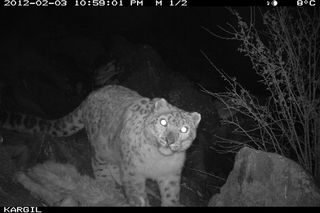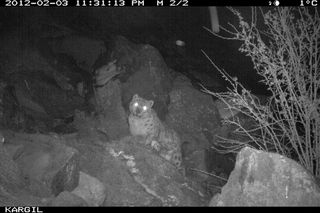
New Photos Show Endangered Snow Leopards in Kashmir

An oft war-torn region of the Himalayas is now home to at least two endangered snow leopards, new photos taken by a conservation group have shown.
Camera traps set up in Kashmir, just a few miles from the line of control separating the Indian province from Pakistan, snapped photos of the elusive cats, and the international conservation organization WWF is hailing their return to the mountain region, home to some of the tallest mountains on Earth.
A team with WWF-India set up the infrared camera traps in Kargil, a region of Kashmir, in mid-2010. The recent images provide only the second photographic evidence ever captured indicating snow leopards are now living in the region.

In 2009, camera traps set up in another area of the Kargil district captured images of snow leopards preying on a heard of Asiatic ibex.
Although the traps set up in 2010 didn't yield results for a year and a half, analysis of the recently captured images shows that two adult snow leopards are prowling the area, said Aishwarya Maheshwar, the Indian scientist behind the project.
"Overall, we got more than 500 photographs from two separate captures," Maheshwar said in a statement. "I am excited to share this news with the world."
The IUCN, an independent international body that assesses the status of species around the globe, has listed snow leopards as endangered since at least 1986. The big cats, known for their cloudy gray fur and dark spots, are native to Central Asia's high mountains, and their numbers have been decreasing.
Sign up for the Live Science daily newsletter now
Get the world’s most fascinating discoveries delivered straight to your inbox.
Reliable numbers are difficult to establish, but it is estimated that between 4,000 and 6,500 snow leopards are left in the wild.
Recently, camera traps have also spotted snow leopards in Afghanistan, Bhutan, Siberia and Tajikistan, where the notoriously shy creatures stole one of the cameras spying on them.
This story was provided by OurAmazingPlanet, a sister site to LiveScience.
Most Popular






